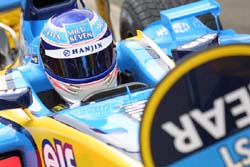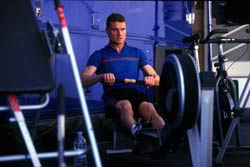
As discussed in previous articles, the F1™ driver has to be in tip top condition for most of the year and together with their training they have to maintain a healthy diet.
A continuous consumption of incorrect food can slow down the metabolism, affecting not only the body's reaction but also the mind. Simply put, a balanced diet of carbohydrates, which give energy, protein to replenish muscles and a variety of vitamins and minerals to aid the digestive system is what racers must aim for.
The expression "you eat like a king at breakfast, eat like a prince at lunch and eat like a pauper at dinner" literally describes the diet of drivers. Breakfast normally consists of a bowl of cereal, an egg or two (preferably boiled), a pot of yogurt and fruit salad.
David Coulthard sticks to his Scottish roots and opts for porridge rather than cereal, but whatever form it takes a good intake of fibre is essential. Drivers also need plenty of fluid first thing in the morning to kick-start the system and this is usually milk or water.
Lunch has to be a good energy supplier, therefore it mainly consists of carbohydrates such as pasta. Drivers tend to avoid rich sauces such as carbonara or four cheeses, but enjoy pomodoro sauce or olive oil.
Former F1 racer Jean Alesi loves garlic oil with hot pepper sauce, while Coulthard likes a little olive oil with some raspberries. The bowl of pasta is accompanied by some vegetables, cooked or fresh.
"There is so much you can eat when vegetables are not cooked. Tomatoes, lettuce, ruccola for example, but if you cook them you can eat more and digest them with more ease. Grill (don't fry!) aubergine, zucchini or broccoli," advises Dr Ricardo Ceccarelli of Toyota.
For the evening meal, a good portion of protein has to be consumed as the body has done a whole day's work, and in order to recover the body needs protein. Grilled fish or lean meat together with some vegetables is often served. Even Michael Schumacher has been seen with a big steak on Sunday after the race, and although a smaller (than lunch) portion of food is recommended, the evening menu is not as restricted as breakfast and lunch.
"Our digestive system has not developed much since our ancestors were up in the trees. Then they were eating nuts throughout the day, and only when they came down to hunt did they start to eat meat," explains Dr Ceccarelli.
"Basically our system is still not catered for digesting meat well. It does take longer to digest and it is healthier to eat many small meals than three big ones."
Dr Ceccarelli is not only looking after Panis and Da Matta as part of his remit at Toyota, but is currently watching over one hundred drivers of all categories. He monitors their training as well as their diet.
"It is very difficult to keep to an ideal diet during a race weekend," he continued. "Ideally a driver should have his pasta at 10:30am before the race, but no one wants that! Then he has to go the briefing and sponsor greetings, so by the time he is free to have his lunch, it is already 12:30pm!"
"Food has to have been fully digested before 2.00pm so he can only have 70g rather than the ideal 120g of pasta then."
Drinking alcohol is clearly not allowed at race weekends but a moderate amount of alcohol at other times is quite acceptable. A glass of sherry, for example, can trigger the stomach to start working so when the food arrives there are already plenty of gastric juice ready to digest.
However, for the race, it is crucial to have a driver "well hydrated". After two hours of racing, a driver loses up to 1.5-1.8kg of liquid. "It does not harm you to drink whatever amount of water. Our bodies are very clever, the excess can be gotten rid of quite easily," Dr Ceccarelli added.
"Also plenty of water reduces the risk of kidney or pancreatic stones. However, be aware of fruit juices. They are good for vitamin C but they contain fructose, fruit sugar, so in excess they are not good."
Drivers follow a regimented routine but this is only to aid their physical
training and to keep lean. In fact, drivers' programmes are not as severe as
those of cyclists or gymnasts.

"Of course drivers have to be conscious of their weight and condition but they are sitting in a car which boasts 800 horsepower!" Dr Ceccarelli exclaimed when questioned. "Whereas long distance runners, cyclists and gymnasts follow a stricter regime."
So what is the "superfood" that drivers have to take on board? "Milk and egg, these are two essential items for a drivers' diet." declared Dr Ceccarelli.
"Milk has everything we need. It has protein, calcium and other vitamins - even carbohydrates. Everyone is so conscious of fat, but instead of having mayonnaise, butter and cookies just have full fat milk."
"If you have a sweet tooth, use honey. It is so rich in vitamins. People have a misconception about this, but the egg white is so nutritious. Yolk has got nutrition, of course, so two eggs a day is a good start."
"Also, it is still new to Europe but Soya is very, very good. It has been [part of] the staple diet in Asia, and with its high protein content and no fat it is a good alternative to meat."
And the foods to avoid? "Cheese, salami, and bread!" he responds. Just the kind of things you would find in your fridge, so be aware!